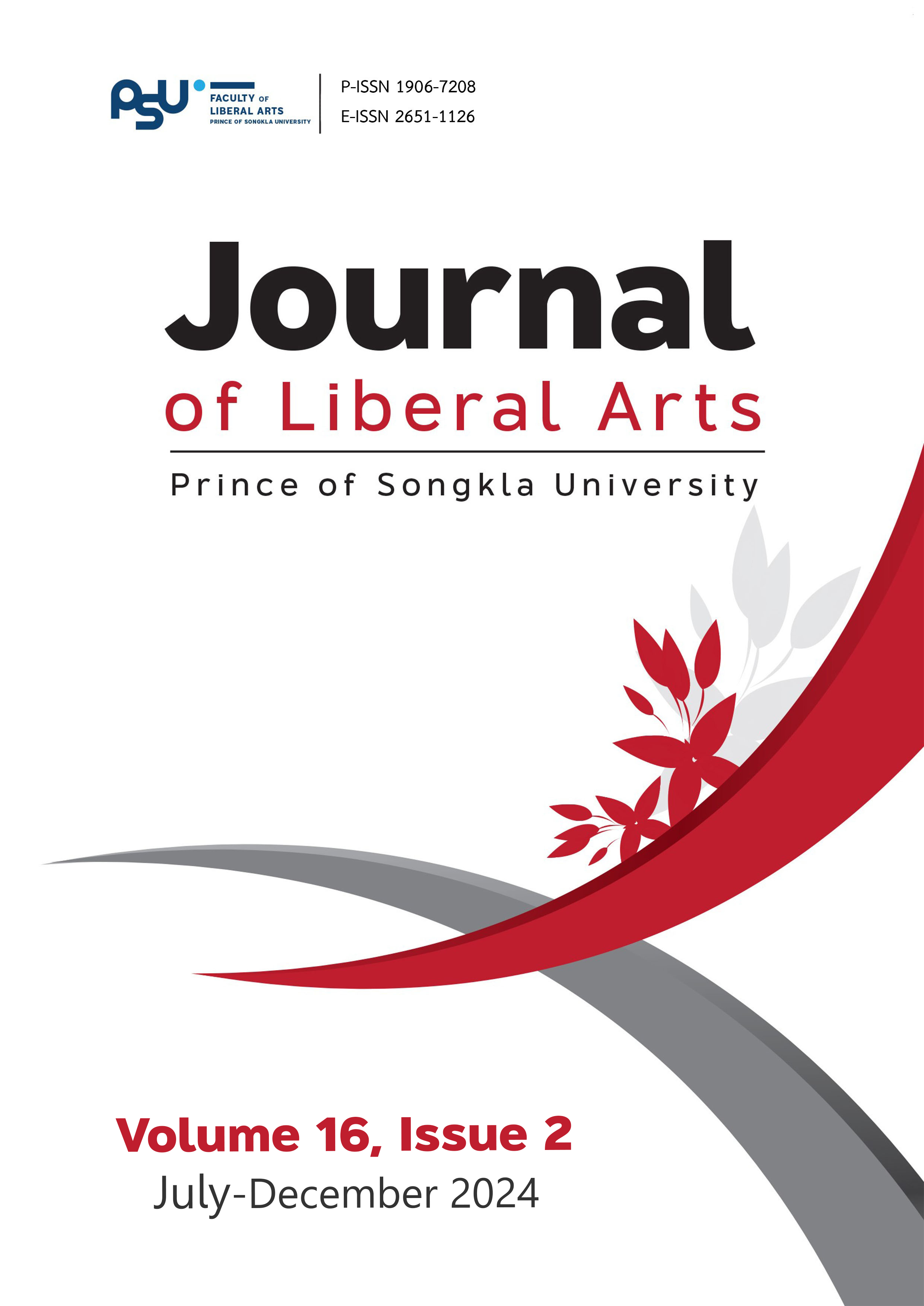Building Community, Driving Sales: The Influence of Solidarity in Online University Marketplace
DOI:
https://doi.org/10.14456/jlapsu.2024.14Keywords:
Solidarity, Solidarity Discourse, Online University Marketplace, Consumer Behavior, Selling CaptionsAbstract
This research explores how solidarity promotes sales in a Thai online university marketplace and its influence on purchasing decisions. Initiated by alumni in response to the Covid-19 pandemic, this marketplace functions as a problem-solving community, enhancing member engagement. By employing Alharbi’s theory of solidarity discourse, the research revealed features of the discourse that reinforce community bonds and advance commercial success, as well as specific marketing strategies related to solidarity. Through a solidarity discourse analysis of 120 online selling captions and a survey of 400 community members on the influence of solidarity and seller status on purchasing decisions, this study delineated the mechanisms through which sellers foster group solidarity. The analysis identified five distinct acts of solidarity discourse (namely commissive, assertive, identifying, regrouping, and persuasive acts), assessed their perceived impacts on purchasing behaviors, and evaluated the influence of seller status. The results indicate varied levels of the influence of solidarity on consumer purchasing decisions, offering insights into the effectiveness of different solidarity strategies in promoting group cohesion and facilitating business objectives. This investigation contributes to the understanding of online community dynamics and their implications for marketing and consumer purchasing decisions on digital platforms.
References
Alharbi, A. (2018). Towards a performative theory of solidarity discourse. Cogent Arts & Humanities, 5(1). https://doi:10.1080/23311983.2018.1495044 Alharbi, A., & Rucker, M. (2023). Discursive practices of the performative theory of solidarity discourse. Language Sciences, 95. https://doi:10.1016/j.langsci.2022.101515
Austin, J. L. (1962). How to do things with words. Oxford University Press.
Baumeister, R. (2012). Need-to-Belong Theory. In P. A. Van Lange, A. W. Kruglanski & E. T. Higgins (Eds.), Handbook of theories of social psychology: Volume 2 (pp. 121–140). SAGE Publications Ltd. https://doi.org/10.4135/9781446249222
Facebook Community. (2018). Discover new badges to recognize admins and outstanding members. Facebook. https://www.facebook.com/community/whats-new/facebook-group-badges/
Georgiou, M. (2016). Facebook page or group - Which is better for your business?. SocialMediaToday. https://www.socialmediatoday.com/social-networks/Facebook-page-or-group-which-better-your-business
Hechter, M. (1987). Principles of group solidarity. University of California Press.
Hechter, M. (2001). Solidarity, sociology of. International Encyclopedia of the Social & Behavioral Sciences, 14588–14591. https://doi:10.1016/b0-08-043076-7/01969-0
Kulow, K., Bentley, K., & Rajagopal, P. (2021). Together we stand: The solidarity effect of personized sellers on essential workers. Journal of the Association for Consumer Research, 6(1), 178–186. https://doi.org/10.1086/711731
Lestari, M., & Wahyono, W. (2021). The influence of celebrity endorser and online promotion on purchase decision through brand image. Management Analysis Journal, 10(2), 198–211. https://doi.org/10.54408/jabter.v2i6.199
Mulyana, A., Briandana, R., & Puspa, D. A. (2019). Social construction fandom as cultural industry marketing of JKT 48 Fan group. International Research Journal of Business Studies, 12(3), 257–266. https://doaj.org/article/90de924cc5294e2a9aaf2e2c19743e88
Prainsack, B., & Buyx, A. (2011). Solidarity: Reflections on an emerging concept in bioethics. ESP Colour Ltd. https://www.nuffieldbioethics.org/assets/pdfs/Solidarity-report.pdf
Prainsack, B., & Buyx, A. (2017). Solidarity in biomedicine and beyond. Cambridge University Press.
Rubin, R. B., Palmgreen, P., & Sypher, H. E. (2004). Communication research measures: A sourcebook (1st ed.). Routledge.
Sam, M. S. (2013). Group solidarity. Psychology Dictionary. https://psychologydictionary.org/group-solidarity/
Sanguankaew, S., Laeheem, K., Dhammasaccakarn, W., & Jeawkok, J. (2020). Bpatjai thee mee bohtbaat samkhan thee tham hai geert khwaamcheuuamnaaen thaang sangkhohm. (in Thai) [Important role factors affecting social cohesion]. Journal of Liberal Arts, Maejo University, 8(1), 194-261.
Taibanguai, K., (2022). Attentional capture strategies: A multimodal discourse analysis of online selling posts and its impacts on viewers [Unpublished master’s thesis]. Mahidol University.
Taibanguai, K., & Suraratdecha, S. (2022). Strategies to grab attention: A multimodal discourse analysis of online selling posts. NIDA Journal of Language and Communication, 27(42), 47-67.
Fisse, T., & Haas, C. (2020). Covid-19 and true solidarity on the internet – digital society blog. HIIG. https://www.hiig.de/en/covid-19-and-true-solidarity-on-the-internet/
Unger, S. H. (2014). The need for solidarity. http://www1.cs.columbia.edu/~unger/articles/solidarity.html
World Bank. (2022). COVID-19 to plunge global economy into worst recession since World War II. World Bank Group. https://www.worldbank.org/en/news/press-release/2020/06/08/covid-19-to-plunge-global-economy-into-worst-recession-since-world-war-ii
Yamane, T. (1967). Statistics: An introductory analysis (2nd ed.). Harper and Row.
Yan, B., Zhang, X., Wu, L., Zhu, H., & Chen, B. (2020). Why do countries respond differently to COVID-19? A comparative study of Sweden, China, France, and Japan. American Review of Public Administration, 50(6–7), 762–769. https://doi:10.1177/0275074020942445.
Downloads
Published
How to Cite
Issue
Section
License
Copyright (c) 2024 Kittima Taibanguai, Sumittra Suraratdecha

This work is licensed under a Creative Commons Attribution-NonCommercial-NoDerivatives 4.0 International License.
The authors retain the copyright to their article but the Journal of Liberal Arts, Prince of Songkla University reserves the exclusive rights to first publication.






